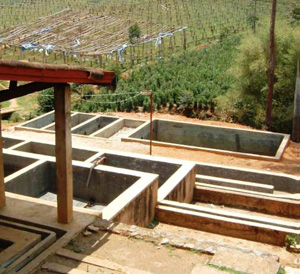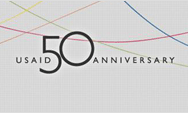You are here » Home » Telling Our Story
Snapshot
USAID helps coffee wash stations treat wastewater, ensuring better conditions for farmers and their families
Protecting Water Resources to Improve Coffee Returns

Photo: Burundi Policy Reform Program
USAID has helped the Burundi coffee sector make use of wastewater filters, like the one shown above, to improve water quality and help farmers receive international certifications for their exports.
Environmental certifications allow farmers' coffee to access international markets and better prices.
Coffee accounts for roughly 80 percent of Burundi's export earnings as nearly 800,000 rural families make their living from the crop. Most of Burundi's coffee washing stations process coffee cherry without the necessary environmental controls to receive specialty certifications like Utz, Starbucks, and Rainforest Alliance. Implementing the environmental controls to attain this level of certification is important for environmental stewardship. It is equally crucial for the farmers. Certification allows their coffee to access international markets and better prices.
In Burundi, USAID is working with nine pilot coffee washing stations to treat their wastewater. The Agency assisted these same stations to construct latrine blocks to curb insanitary conditions around coffee washing stations.
Additionally, the pollution from the station's wastewater causes serious environmental harm. To help ensure clean water, USAID used an innovative three-step process to screen, filter, and treat the waste materials prior to joining downstream ground waters.
Diverting and screening the majority of pulp slurry, an acidic byproduct of coffee washing wastewater, removes the primary source of toxic water pollutants early in the process. The pulp is eventually composted and applied to horticulture crops and coffee plantations, increasing productivity.
Prior to the introduction of these wastewater control systems, environmental impacts were felt as much as five kilometers downstream causing fish kills, crop burns, and foul odors, making these waters a hazard to people and livestock. Today, the nine stations have ventilated improved pit latrines, and are able to treat nearly all the water used for coffee process, thereby
ensuring clean water for agricultural and ecosystem uses.
The stations are also gradually introducing more water-efficient depulping machines. These actions process coffee cherry in an environmentally responsible manner and improve the quality of life and health, and boost incomes of the farmers.
Print-friendly version of this page (533kb - PDF)
Click here for high-res photo
Back to Top ^
|




